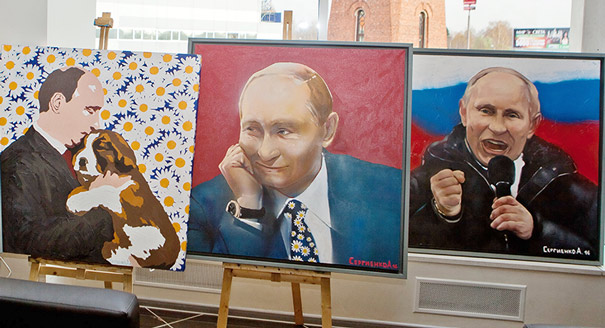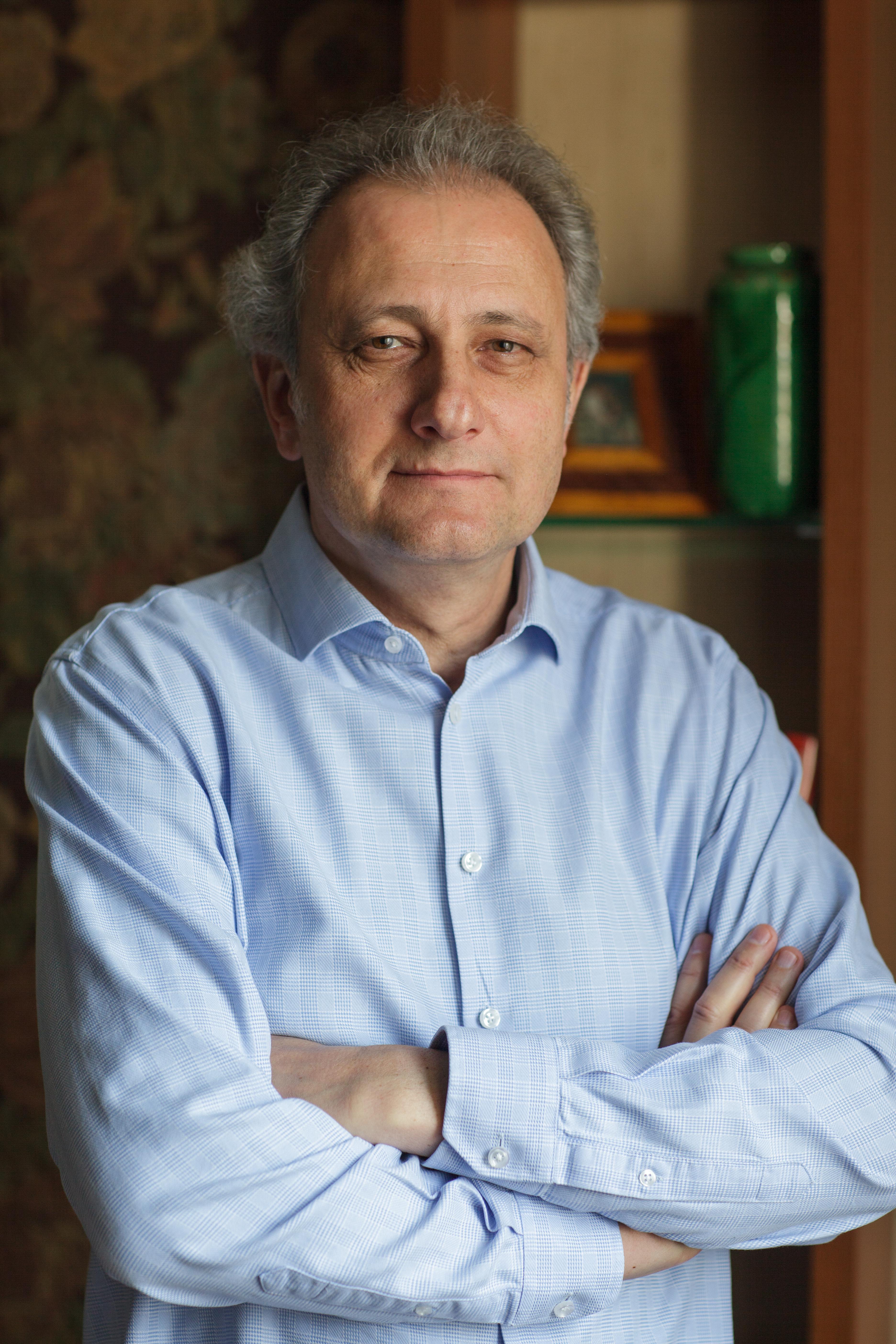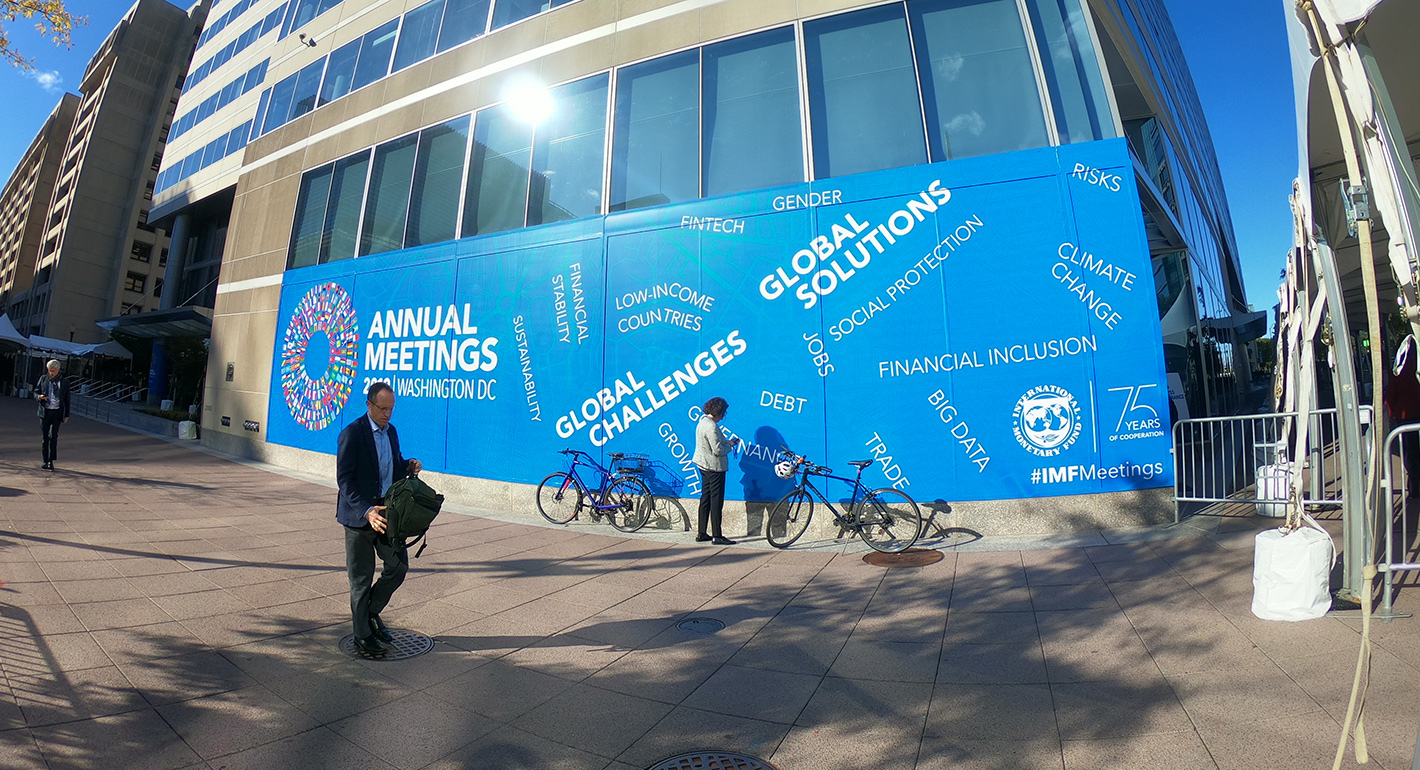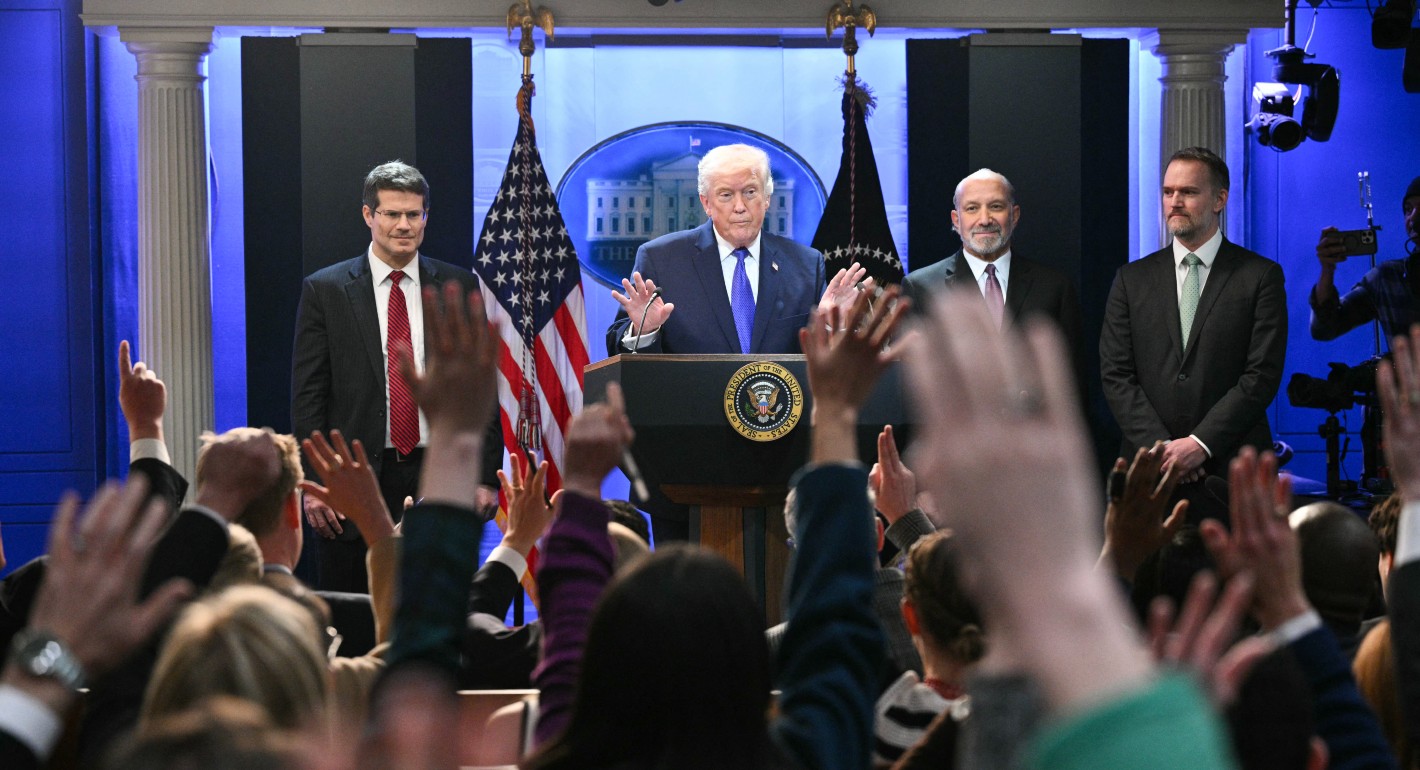Andrei Kolesnikov
{
"authors": [
"Andrei Kolesnikov"
],
"type": "commentary",
"centerAffiliationAll": "",
"centers": [
"Carnegie Endowment for International Peace",
"Carnegie Russia Eurasia Center"
],
"collections": [
"Inside Russia"
],
"englishNewsletterAll": "",
"nonEnglishNewsletterAll": "",
"primaryCenter": "Carnegie Endowment for International Peace",
"programAffiliation": "",
"programs": [],
"projects": [],
"regions": [],
"topics": [
"Economy"
]
}
Source: Getty
Project Inertia: The Outlook for Putin’s Fourth Term
Do not expect modernization after Putin’s 2018 reelection. Instead, the system he built will function on autopilot as the Russian leader continues to lose direct control over events, ideas, and actions. But that doesn’t imply democratization. In essence, the head of state finds himself chained to the galley that he built himself.
President Vladimir Putin has become the permanent fixture of Russian political life. His official portrait hangs seemingly eternally on the wall. Hence, his impending reelection in 2018 generates extremely low expectations. No one is waiting for extraordinary initiatives and remarkable achievements. The transition to his fourth term will change nothing in the average Russian’s life—at least not immediately after the election.
The best Putin can offer is the old status quo without deterioration. In fact, that may be his political program: rowing harder to keep the ship of state in the same place. This is why the ruling regime needs to make some changes within both the federal and regional elites. But these changes are, in fact, superficial. They do little to address the fundamental challenges facing the country and its regime.
Putin is forming his 2018 team on the basis of the candidates’ loyalty and technocratic abilities. The team consists of people whom we could call “liaison officers” —bureaucratic executives who are generally younger than the crony capitalist figures of the past. They should act rationally to keep the regime more or less safe from collapse, corruption, and inefficiency. The new bureaucrats are tasked with maintaining the system’s stability without altering anything of significance. It is essentially the same task that faced the Soviet bureaucracy at the end of the communist period. Yet that empire collapsed—and not because the bureaucrats didn’t try hard enough. The system was simply inefficient.
This is the trap in which the Putin regime finds itself. The basis of the system isn’t changing or growing more viable. On the contrary, recent personnel upheavals and governor resignations testify to a system in crisis. The regime is trying to break the administrative impasse through extravagant government reshuffles.
Russian politics is comprised of a series of messages with separate meanings for the elite and the public. The new appointments tell the elite, “These are the people we have chosen, so you should strive to be like them.” The people get a different message, “These cool-headed young bureaucrats will now lead you, so your future is bright.”
Other messages—like the president’s naked torso on television—are even more transparent. Here, every segment of society gets the same message: “I am not going anywhere. I’m in good shape and will rule for quite a while.” But sometimes visual cues can be misleading. For example, if we see Defense Minister Sergei Shoigu fishing with the president, it doesn’t necessarily mean he will be Putin’s successor.
However, when Prime Minister Dmitry Medvedev appears alongside Putin—mostly while on vacation — the president is sending an important message. He is in effect saying, “Medvedev is still with me. I support him. Let’s not jump to conclusions about his impending resignation.”
One way Putin survives is by playing the message game. He does the unexpected to catch everyone by surprise. The recent wave of dismissals of governors was a flashy move in the 2018 presidential election campaign, which hadn’t even officially begun at the time. In fact, Putin’s behavior as president suggests that he has never stopped campaigning for reelection over the last eighteen years.
For law-abiding citizens, voting in the 2018 election is akin to performing a religious rite. Less than 70 percent of Russians will vote for Putin this time, but he will realistically get more than 50 percent of the vote. And yet the absence of real competition for the presidency doesn’t necessarily mean the president has the absolute power he seemed to enjoy until recently.
In essence, the current Russian regime resembles a kind of political blockchain. Democratic institutions, including civilian oversight, do not function and Putin cannot control everything on a case-by-case basis. As a result, the blocks in the chain—elite clans, security factions, pro-government liberals, and regional elites—occasionally take on a life of their own and engage in struggles with each other. Yet the system remains centralized and seeks to strengthen this centralization, by, for example, appointing “liaison officers” as governors.
Putin maintains the balance between various factions of the political elite. On important questions, these groups and government bodies—including law enforcement agencies—still take into consideration the president’s opinion and orders. Becoming completely independent is too dangerous, as we occasionally learn from high-profile sackings and arrests.
The Russian regime extends its all-encompassing monopoly to the opposition as well. Parliament contains only a pseudo-opposition, something that actually discredits Russian parliamentarism and makes political parties the least trusted institution in the country, according to polling data. The official opposition parties are built around aging leaders.
Even the ruling United Russia party is merely an instrument for rallying Putin’s political supporters, but one that now needs the president more than he needs it. As a result, the party system will likely be rebranded and relaunched either before or after the 2021 parliamentary elections. The first step in this direction was made by the Communist party, which invented the new candidate—the potentially charismatic sovkhoz director Pavel Grudinin.
Even the genuine opposition remains too chaotic and disjointed to pose a challenge to the authorities. Alexei Navalny, its most interesting and promising figure, is only a limited threat. The authorities started taking him seriously after his strong performance in Moscow’s 2013 mayoral elections. They are holding his brother hostage in prison and occasionally arrest the anti-corruption crusader himself.
But the Kremlin is apparently not ready to lock Navalny up for a longer term just yet. The authorities simply don’t want Navalny to be seen as a persecuted victim of the regime, as that would further boost his popularity across the country. Thus, the best strategy is to ignore him and disrupt his activities in every possible way, including through arrest.
As the Kremlin will not let him run for president, the main goal of Navalny’s tour around the country this fall was to become better recognized in the regions. He is pursuing a long-term strategy in which 2018 is an opportunity to grow his popularity in time for the next presidential cycle.
However, despite being the only genuinely noteworthy politician in Russia today, Navalny fails to consolidate all opposition-minded voters. Despite his best efforts he is no Boris Yeltsin, the man who became a unifying figure in the late 1980s, when everyone understood that Russia must break with its communist ideology. What’s more, the Russian democratic opposition has long been infected with narcissism and prone to hair-splitting. A meeting between two opposition leaders usually ends in an argument.
Other opposition figures envy Navalny. Some can unwittingly spoil the race—for example, television personality Ksenia Sobchak, who recently announced that she is running for president. Despite labeling herself as the “against all” candidate, Sobchak isn’t truly against everyone. She is for herself and essentially for Putin, since she generates intrigue for his campaign. And she won’t be able to hand her votes to Navalny by withdrawing from the race, since he’ll never be allowed to run anyway.
Sobchak represents the glamorous opposition of freethinkers who limit their political activism to expensive restaurants and beauty salons while sipping another glass of French wine. However, her entry into politics is a kind of test for a new way of presenting politicians to the public in an era when visual image eclipses all.
In addition, Sobchak may revive fragments of local liberal discourse, for instance, when she talks about the illegitimacy of the takeover of Crimea. On the other hand, she could also discredit this discourse by nature of her personality.
Former Duma deputy Dmitry Gudkov, who managed to assemble a strong slate of candidates for the Moscow municipal elections in September 2017, offered another liberal opposition strategy. By taking advantage of the growing civic participation by Moscow residents who previously stayed out of politics, Gudkov demonstrated that one can take the more arduous road of entering government from the bottom when opposition politicians are blocked from entering politics at the top. The Gudkov model also somewhat rehabilitates elections in the eyes of democratic voters, demonstrating that this seemingly dysfunctional instrument can work.
We should view the 2018 election as coronation by plebiscite. But that does not mean Russia’s future is a done deal. Many questions remain open: Will Putin pick a successor or find a way to stay in power beyond 2024? Will he appoint the successor as the prime minister first? And how can he keep the balance between the conservatives and the pro-regime liberals?
One succession scenario—in which Putin resigns a few years into his new term and announces early elections—looks less plausible at the moment. At the same time, the longer he stays in power, the harder it will be to exit. How can he abandon such a complicated system, which is essentially his personal project?
The head of state finds himself chained to the galley that he built himself. Abandoning ship would spell danger: even if he chooses a successor, chaos might ensue. His own life could even be at risk. As a result, Putin is unlikely to start modernizing the country in earnest. That would require bucking the system he has been building for two decades. And even if he tries, that system will actively and successfully resist the changes.
Instead, Putin would prefer to let inertia take its course and essentially enjoy a repeat of his 2012–2018 term. But his fourth term will look slightly worse because the decline of the system could prove uncontrollable. That won’t come from economic catastrophe or revolutionary political transformation, as Russia lacks the preconditions for both. Instead, Putin will be gradually losing direct control over events, ideas, and actions. The system will function on autopilot, but without a prospect of democratization.
This situation resembles the later years of Francisco Franco’s rule over Spain. Like the Caudillo, Putin is transitioning from being the father of the nation to its grandfather. However, the regime isn’t growing kinder, it is just becoming frail. Like Franco, Putin remains the umbrella brand for all power groups, none of which wants to leave the shelter of the umbrella. That would mean a loss of protection. However, Franco had a succession mechanism in the person of King Juan Carlos. Putin, on the other hand, has no Juan Carlos of his own.
In a recent interview, Mikhail Khodorkovsky said, “[T]he question that we should ask is not who is to replace Putin, but rather what is to replace him.” He meant that changing the nature of the political regime is more important than changing the people in power. Theoretically, Putin’s system can outlast President Putin himself. But since power in Russia is extremely personified, “what” always implies “who.” The individual chosen to succeed Putin—whether a liberal or a silovik—will most likely symbolize a distinct development trajectory for the country.
For now, however, we are witnessing an enduring depression of Russian political, economic, and social life. The quality of the GDP growth is low. Reshuffles at the top change nothing about the system. More optimistic public moods merely reflect people’s fatigue with destabilization—they simply want to believe that something will get better. Mass consciousness still suffers from “Crimean reunification syndrome” and is becoming increasingly archaic.
People get new technocratic officials in lieu of change. Excessive regulation and corruption slow down private enterprise. The authorities suppress civic activism, drowning it in a sea of rituals and holiday fireworks displays. The government encourages dependency on state subsidies.
The country is being governed through fasting, praying, and pyrotechnics. Trust is in short supply. As the regime preserves itself, so do the people. Soviet citizens liked to joke, “You pretend to pay us, and we pretend to work.” That’s what seems to be happening now. People are willing to defraud the state but are simultaneously proud of its greatness—an example of collective identity amid deeply individualistic practices in everyday life.
The March 2018 election will be a moment of transition—but within the political system that crystallized in Russia from 2012 to 2017. Once Putin is reelected, we will enter a new political cycle, but it is too early to say whether it will consist of just more of the system or whether there will be a sudden break with the inertia that characterizes the current political scene.
About the Author

Former Senior Fellow, Carnegie Russia Eurasia Center
Kolesnikov was a senior fellow at the Carnegie Russia Eurasia Center.
- How the Putin Regime Subverted the Soviet LegacyCommentary
- Putin’s New Social JusticeCommentary
Andrei Kolesnikov
Recent Work
Carnegie does not take institutional positions on public policy issues; the views represented herein are those of the author(s) and do not necessarily reflect the views of Carnegie, its staff, or its trustees.
More Work from Carnegie Endowment for International Peace
- The Gulf Monarchies Are Caught Between Iran’s Desperation and the U.S.’s RecklessnessCommentary
Only collective security can protect fragile economic models.
Andrew Leber
- Duqm at the Crossroads: Oman’s Strategic Port and Its Role in Vision 2040Commentary
In a volatile Middle East, the Omani port of Duqm offers stability, neutrality, and opportunity. Could this hidden port become the ultimate safe harbor for global trade?
Giorgio Cafiero, Samuel Ramani
- Beijing Doesn’t Think Like Washington—and the Iran Conflict Shows WhyCommentary
Arguing that Chinese policy is hung on alliances—with imputations of obligation—misses the point.
Evan A. Feigenbaum
- Getting Debt Sustainability Analysis Right: Eight Reforms for the Framework for Low-Income CountriesPaper
The pace of change in the global economy suggests that the IMF and World Bank could be ambitious as they review their debt sustainability framework.
C. Randall Henning
- How Middle Powers Are Responding to Trump’s Tariff ShiftsCommentary
Despite considerable challenges, the CPTPP countries and the EU recognize the need for collective action.
Barbara Weisel







